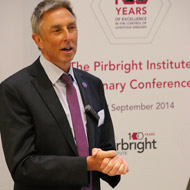
Conference highlights research advances in livestock disease and zoonotic viruses
The Pirbright Institute hosted its Centenary Conference last week to mark 100 years of prevention and control of livestock infectious diseases and to discuss current research into virus diseases of livestock and zoonotic viruses.
The event, held at the University of Surrey, showcased the importance, challenges and progress in the control of livestock diseases and zoonoses. It also gave delegates the opportunity to interact and debate recent advances in the control, epidemiology, virology, immunology and vaccionology of viral diseases of livestock - including poultry and viral zoonoses. Delegates were also able to tour the institute's new state-of-the-art biocontainment laboratory facility, the BBSRC National Virology Centre: The Plowright Building.
During his welcome speech, Professor John Fazakerley, director of The Pirbright Institute, said: “The Pirbright Institute has been prominently involved in research to prevent and control infectious diseases of livestock since 1914 when the first cattle testing station was established to combat tuberculosis. There have been many achievements along the decades and, a hundred years on, the institute is a world-leading centre of excellence for surveillance and research to prevent and control virus diseases of livestock and viruses that spread from animals to people.”
"This Centenary Conference marks an important milestone in the Institute’s history and provides an opportunity for scientists, veterinarians and policy makers to discuss recent advances in viral disease research.”
A comprehensive programme was presented by leading scientists from around the world. It included basic and applied research covering four main themes: control, vaccines and immunology; pathogenesis; surveillance and discovery; and One Health.
Scientists from the Pirbright Institute also delivered presentations at the conference, including the head of the World Reference Laboratory for Foot and Mouth Disease, Dr. Don King, who stressed the importance of the institute's work in the prevention and control of many important diseases affecting livestock, poultry and humans.
Other talks from senior scientists from across the globe reviewed aspects of genetic modification, diagnostic development, vaccine development, epidemiology of specific viral diseases and virus evolution.
Image (C) The Pirbright Institute



 The Veterinary Medicines Directorate (VMD) is inviting applications from veterinary students to attend a one-week extramural studies (EMS) placement in July 2026.
The Veterinary Medicines Directorate (VMD) is inviting applications from veterinary students to attend a one-week extramural studies (EMS) placement in July 2026.